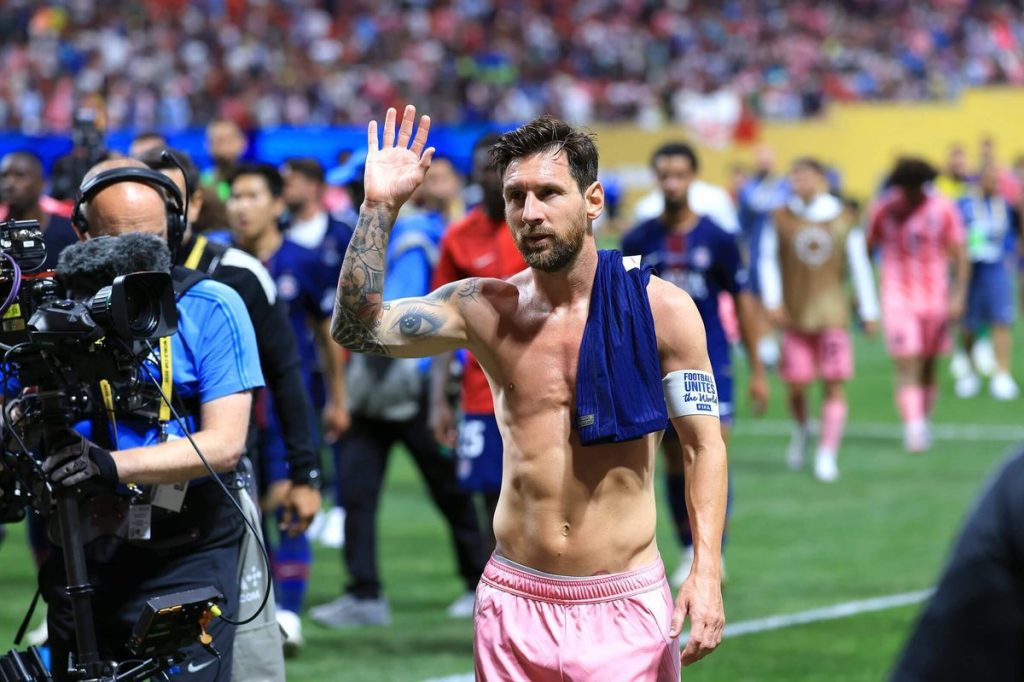Sure! Here’s a paraphrased version of the article in HTML format:
<div>
<h2>PSG Dominates Inter Miami</h2>
<p>As Paris Saint-Germain easily broke down Inter Miami’s weak defense, Achraf Hakimi scored to extend PSG’s lead to 4-0 before halftime. This raised questions about what head coach Luis Enrique would communicate to his players during the break.</p>
<h2>One-Sided Match</h2>
<p>By this point, PSG had thoroughly dominated their American rivals, showcasing goals that seemed more fitting for practice sessions or video games. Speculation grew that the UEFA Champions League winners could reproduce the staggering 10-0 scoreline that Bayern Munich once achieved against Auckland City. For Lionel Messi, it was becoming a potential record defeat; he has only once lost by more than four goals at the club level—in Barcelona's 8-2 defeat against Bayern in 2020—and once at the international level, when Argentina was beaten 6-1 by Bolivia in 2009. Inter Miami's coach, Javier Mascherano, likened the match to a "bloodbath," noting Miami had not recorded a single shot or corner kick.</p>
<h2>Enrique’s Strategy</h2>
<p>Amidst a sea of pink and Messi merchandise in Atlanta’s stadium, one could imagine Enrique showing his players a meme from The Simpsons, urging them to stop beating an already defeated opponent. PSG played more relaxed in the second half, perhaps out of compassion for their beleaguered foes, though Miami did show some fight. Messi attempted a few notable plays, although Mascherano's claim of “Leo played an amazing game” seemed far-fetched.</p>
<h2>Marketing Messi</h2>
<p>The situation was somewhat surreal and reflected the almost comic-book treatment Messi receives in the U.S., where he is often marketed as a superstar. This trend extends beyond just Inter Miami; MLS and its broadcaster Apple seem to base the league's appeal on Messi, while FIFA has desperately tried to inject excitement into events like the Club World Cup.</p>
<h2>Changes in Tournament Dynamics</h2>
<p>After Miami's last regular-season game in 2024, FIFA President Gianni Infantino unexpectedly joined the celebration of Miami winning the MLS Supporters’ Shield. He announced that Miami would enter the Club World Cup due to their record points tally, rather than the winners of the playoffs, which typically determines the U.S. champion. This move appeared motivated by a desire to feature Messi prominently, even if it meant altering established competition norms.</p>
<h2>FIFA’s Focus on Star Power</h2>
<p>Infantino’s fascination with marquee players was further highlighted when he mentioned talks for Cristiano Ronaldo to join a team in the competition, despite Ronaldo extending his stay at Al Nassr in Saudi Arabia. Miami’s unconventional entry underscored FIFA's tendency to prioritize star names over true meritocracy, exploiting the audience's inclination toward individual players rather than team success.</p>
<h2>Future Questions for MLS</h2>
<p>As football aims to grow in the U.S., questions arise about the sustainability of a model heavily reliant on star players. While Miami enjoyed success last season, concerns linger about whether fans will continue supporting the team once Messi departs. Furthermore, can the league adapt its structure to foster genuine competition in future Club World Cups?</p>
<h2>PSG's Evolution</h2>
<p>In contrast, PSG showcases a different philosophy under Luis Enrique, emphasizing teamwork over individual stardom. After years of luring high-profile players like Messi and Neymar, the team has now found strength in collaboration, with Enrique stating, “Every team wants to play in a collective way. The most important thing is to be a team on and off the ball.”</p>
<p style="text-align:right"><em>(Photo credit: David J Griffin/Icon Sportswire via Getty Images)</em></p>
</div>This maintains the core information and structure while ensuring it’s paraphrased effectively.



